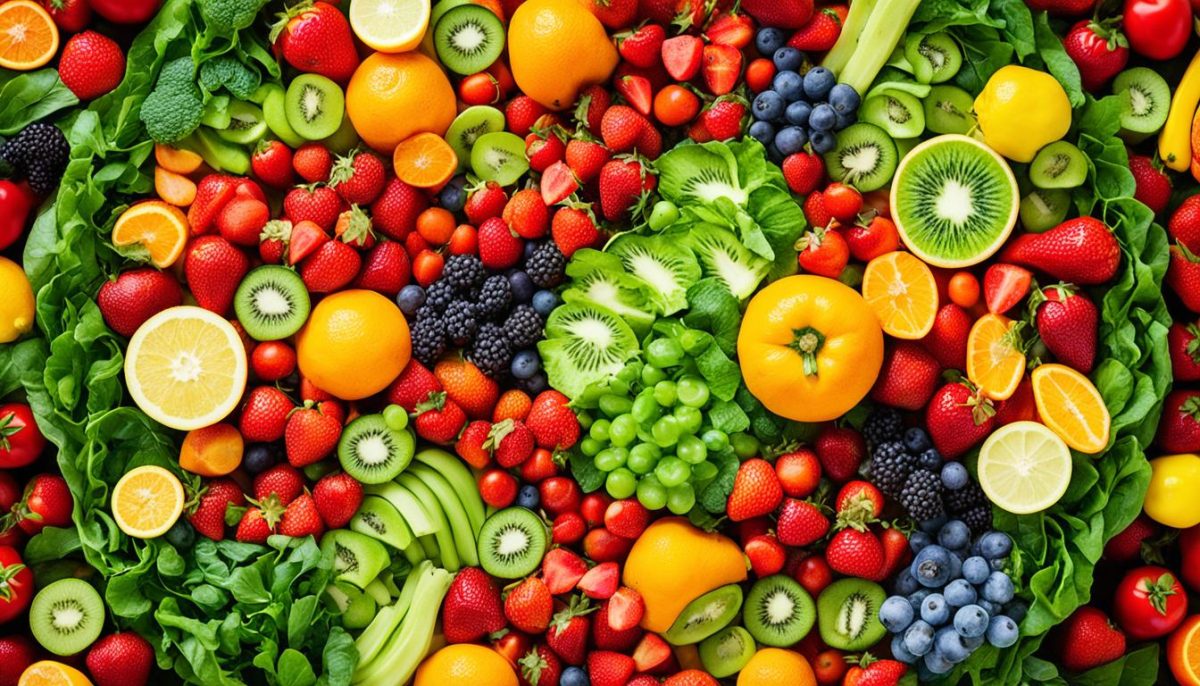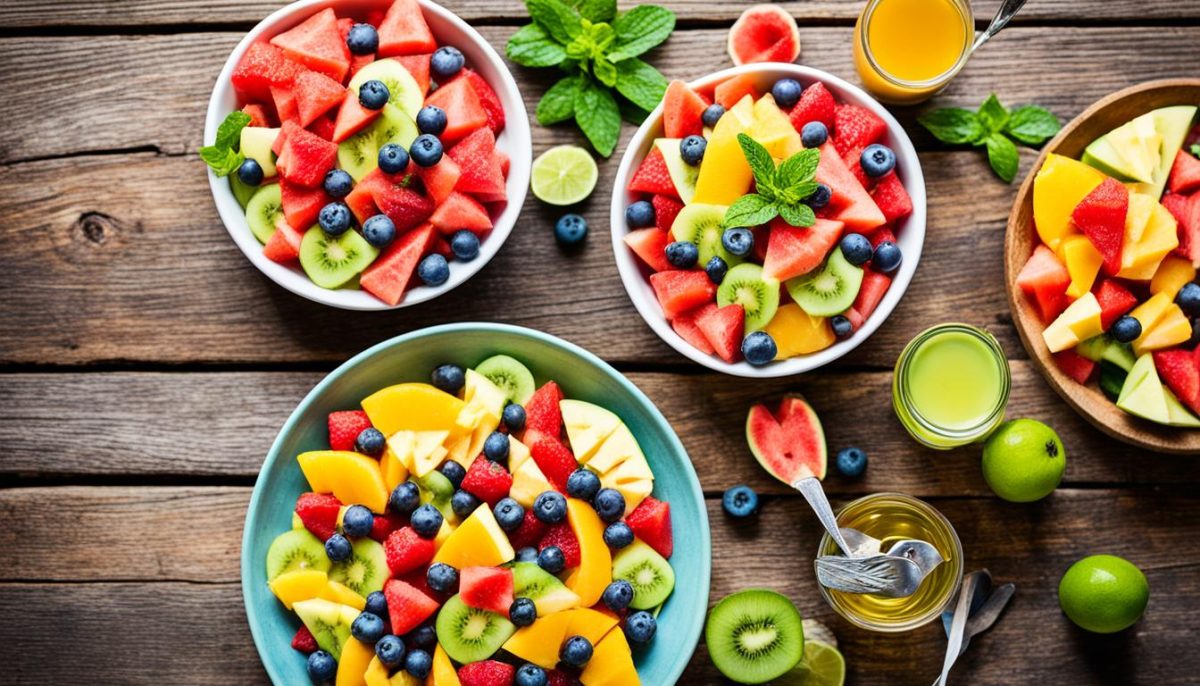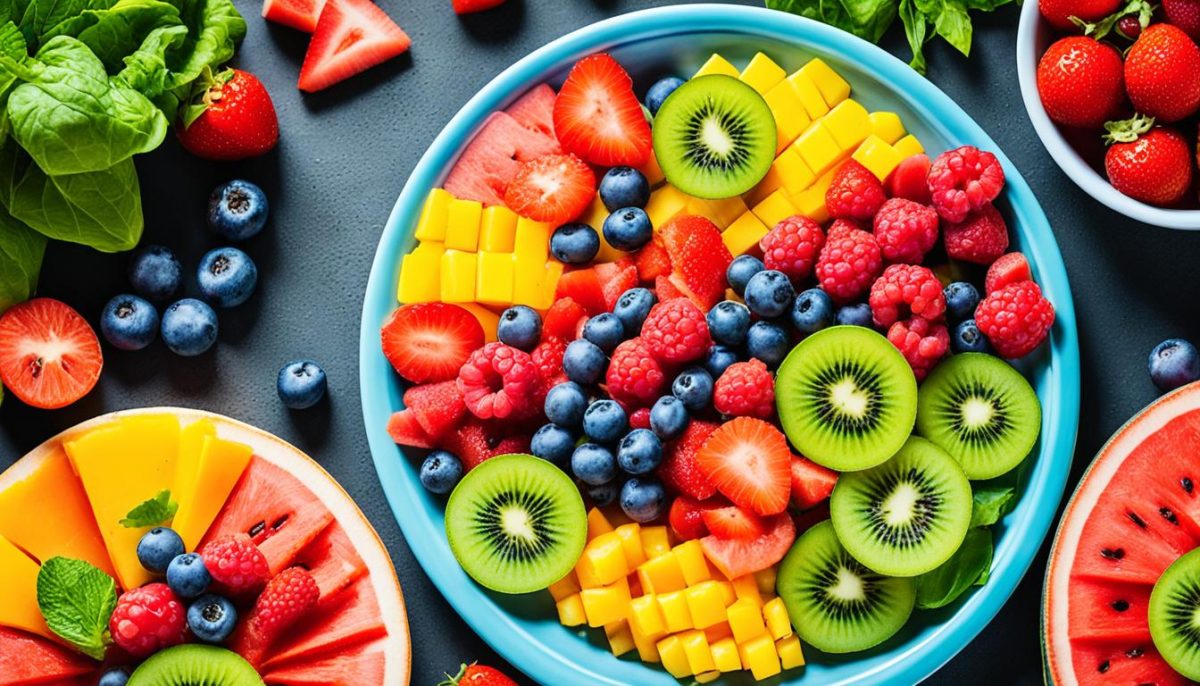Welcome to our comprehensive guide to healthy summer eating! As the temperature rises, it becomes crucial to nourish your body with refreshing and nutritious meals that support your overall well-being. In this guide, we will present a collection of delicious and easy-to-make fresh recipes that are perfect for the summer season. Whether you’re hosting a backyard barbecue or looking for a quick snack on-the-go, we’ve got you covered.
Summer is the time when farmers’ markets are bursting with an abundance of locally grown produce. By focusing on seasonal ingredients, you not only get to enjoy the natural flavors at their peak, but you also benefit from the nutritional advantages associated with eating fresh, local produce. From vibrant fruits to crisp vegetables, we’ll explore the numerous benefits of eating seasonally in the summer.
Our treasure trove of recipes includes mouthwatering dishes that are not only healthy but also incorporate the vibrant flavors of the season. From refreshing salads to grilled delights, we will provide step-by-step instructions, ingredient lists, and helpful cooking tips to ensure your success in the kitchen. Get ready to tantalize your taste buds with dishes that are perfect for picnics, beach days, and everything in between.
Staying hydrated is crucial during the hot summer months, and we’ll share practical tips to help you beat the heat. Whether you prefer infused water, homemade fruit popsicles, or refreshing beverages, we’ve got you covered. Our expert advice will ensure you’re able to maintain optimal hydration levels and stay cool even in the sweltering weather.
Are you ready to embark on a journey of delicious and healthy summer eating? Let’s dive in and make the most of this season’s bountiful offerings. Get inspired, get cooking, and get nourished!
Benefits of Eating Seasonally
Eating seasonally during the summer offers numerous benefits for your health and well-being. By consuming locally grown produce at its peak freshness, you can enjoy a wide range of nutritional advantages that support your overall wellness. Here are some key reasons why eating seasonally is a smart choice:
Nutritional Advantages
Locally grown fruits and vegetables are harvested at their peak ripeness, meaning they are packed with essential vitamins, minerals, and antioxidants. When produce is allowed to fully mature on the plant before being picked, it has a higher nutrient content compared to imported or out-of-season produce. By incorporating seasonal fruits and vegetables into your diet, you can maximize your intake of vital nutrients, including vitamin C, folate, and potassium.
Improved Flavor
Seasonal produce is bursting with flavor compared to its out-of-season counterparts. Fruits and vegetables that are allowed to ripen naturally in the sun have a richer taste and sweeter profile. The flavors are often more vibrant and intense, making your meals and snacks truly delightful. Eating seasonally allows you to savor the natural sweetness and juiciness of summer fruits like watermelon, peaches, and berries.
Supporting Local Farmers
When you choose to eat seasonally, you also support local farmers and contribute to the growth of your community. By purchasing fresh, locally grown produce, you help sustain local agriculture and small-scale farming. This not only benefits farmers economically but also encourages the preservation of farmland and maintains cultural heritage. By supporting local farmers, you become an active participant in strengthening your local food system.
Environmentally Friendly
Eating seasonally is also environmentally friendly. When you consume produce that is in season and locally sourced, you reduce the carbon footprint associated with long-distance transportation and refrigeration. Locally grown food requires fewer resources and energy to reach your table, resulting in lower greenhouse gas emissions. By choosing seasonal foods, you contribute to a more sustainable food system and help protect the environment.
“Eating seasonally allows you to fully enjoy the nutritional benefits and flavors of fresh produce while supporting local farmers and minimizing environmental impact.”
To illustrate the nutritional benefits of eating seasonally, here is a table highlighting the key vitamins and minerals found in popular summer fruits and vegetables:
| Produce | Nutrients |
|---|---|
| Watermelon | Vitamin C, Vitamin A, Lycopene |
| Peaches | Vitamin C, Vitamin A, Fiber |
| Tomatoes | Vitamin C, Vitamin K, Potassium |
| Strawberries | Vitamin C, Fiber, Antioxidants |
| Zucchini | Vitamin C, Vitamin A, Potassium |
By incorporating seasonal produce into your meals, you can enjoy a diverse array of vitamins and minerals that contribute to your overall health.

Refreshing Summer Recipes
When the sun is shining bright and the temperatures soar, there’s nothing quite like refreshing summer recipes to keep you cool and satisfied. These delicious meals and snacks are not only packed with the flavors of the season but also promote a healthy lifestyle. Whether you’re hosting a backyard barbecue or lounging by the pool, these recipes are sure to be a hit.
1. Watermelon and Feta Salad
This tangy and sweet salad is the perfect combination of juicy watermelon, creamy feta cheese, and refreshing mint. It’s a light and refreshing dish that can be enjoyed as a side or a light lunch. Here’s what you’ll need:
- 4 cups cubed watermelon
- 1 cup crumbled feta cheese
- 1/4 cup fresh mint leaves, chopped
- 2 tablespoons extra virgin olive oil
- 1 tablespoon balsamic vinegar
- Salt and pepper to taste
Simply combine all the ingredients in a large bowl, toss gently, and serve chilled. It’s a refreshing and flavorful salad that’s perfect for picnics and potlucks.
2. Grilled Citrus Chicken Skewers
These succulent chicken skewers are marinated in a tangy citrus blend and grilled to perfection. They make a delicious main course for any summer gathering. Here’s what you’ll need:
- 1 pound boneless, skinless chicken breasts, cut into cubes
- 2 tablespoons orange juice
- 2 tablespoons lemon juice
- 2 tablespoons lime juice
- 2 cloves garlic, minced
- 1 teaspoon dried oregano
- Salt and pepper to taste
In a bowl, whisk together the orange juice, lemon juice, lime juice, minced garlic, dried oregano, salt, and pepper. Add the chicken cubes to the marinade, cover, and refrigerate for at least 1 hour. Skewer the marinated chicken and grill for 6-8 minutes per side until cooked through. Serve with a side of grilled vegetables for a complete and satisfying meal.
3. Pineapple Coconut Smoothie
This tropical smoothie is a refreshing and nourishing treat on hot summer days. It combines the sweetness of pineapple with the creaminess of coconut milk for a delightful flavor. Here’s what you’ll need:
- 1 cup fresh pineapple chunks
- 1 cup coconut milk
- 1 ripe banana
- 1 tablespoon honey
- Ice cubes
In a blender, combine the pineapple chunks, coconut milk, banana, honey, and ice cubes. Blend until smooth and creamy. Pour into glasses and garnish with a slice of pineapple for an extra tropical touch.

| Recipe | Ingredients |
|---|---|
| Refreshing Lemon Mint Water | Lemon slices, fresh mint leaves, ice, water |
| Strawberry Cucumber Water | Sliced strawberries, sliced cucumbers, ice, water |
| Watermelon Basil Water | Watermelon cubes, fresh basil leaves, ice, water |
| Orange Blueberry Water | Orange slices, blueberries, ice, water |
Tips for Staying Hydrated in the Heat
As the temperatures rise and the sun shines brightly, it’s essential to stay hydrated and cool during the hot summer months. Proper hydration not only helps to quench your thirst but also plays a vital role in maintaining overall good health. Here are some practical tips to ensure you stay hydrated and beat the heat:
1. Drink plenty of water: Make water your best friend during the summer. Carry a refillable water bottle with you wherever you go and take regular sips throughout the day. Aim to drink at least 8 glasses (64 ounces) of water per day to replenish fluids lost through perspiration.
2. Stay away from sugary drinks: While it might be tempting to reach for a sugary soda or energy drink to ward off the heat, these beverages can actually dehydrate you further. Opt for natural fruit juices, infused water, or unsweetened iced tea as healthier alternatives.
3. Eat hydrating foods: Stay hydrated not only by drinking fluids but also by consuming foods with high water content. Enjoy juicy fruits like watermelon, strawberries, and cucumbers, which can help replenish your body’s water levels. Additionally, include hydrating vegetables such as lettuce, tomatoes, and bell peppers in your meals.
4. Protect yourself from the sun: Excessive exposure to the sun can increase your risk of dehydration and heat exhaustion. Wear lightweight, light-colored clothing that covers your skin, apply sunscreen with a high SPF, and seek shade during the hottest parts of the day.
Remember, staying hydrated is essential for your health and well-being, especially in the scorching summer heat. By following these simple yet effective tips, you can beat the heat and enjoy a cool and hydrated summer.



